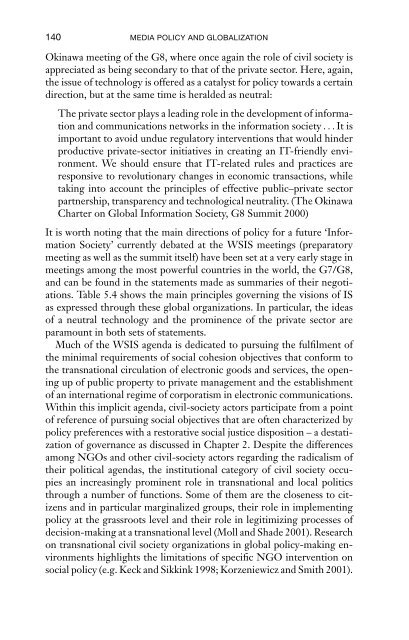Media Policy and Globalization - Blogs Unpad
Media Policy and Globalization - Blogs Unpad
Media Policy and Globalization - Blogs Unpad
You also want an ePaper? Increase the reach of your titles
YUMPU automatically turns print PDFs into web optimized ePapers that Google loves.
140 MEDIA POLICY AND GLOBALIZATION<br />
Okinawa meeting of the G8, where once again the role of civil society is<br />
appreciated as being secondary to that of the private sector. Here, again,<br />
the issue of technology is offered as a catalyst for policy towards a certain<br />
direction, but at the same time is heralded as neutral:<br />
The private sector plays a leading role in the development of information<br />
<strong>and</strong> communications networks in the information society ...It is<br />
important to avoid undue regulatory interventions that would hinder<br />
productive private-sector initiatives in creating an IT-friendly environment.<br />
We should ensure that IT-related rules <strong>and</strong> practices are<br />
responsive to revolutionary changes in economic transactions, while<br />
taking into account the principles of effective public–private sector<br />
partnership, transparency <strong>and</strong> technological neutrality. (The Okinawa<br />
Charter on Global Information Society, G8 Summit 2000)<br />
It is worth noting that the main directions of policy for a future ‘Information<br />
Society’ currently debated at the WSIS meetings (preparatory<br />
meeting as well as the summit itself) have been set at a very early stage in<br />
meetings among the most powerful countries in the world, the G7/G8,<br />
<strong>and</strong> can be found in the statements made as summaries of their negotiations.<br />
Table 5.4 shows the main principles governing the visions of IS<br />
as expressed through these global organizations. In particular, the ideas<br />
of a neutral technology <strong>and</strong> the prominence of the private sector are<br />
paramount in both sets of statements.<br />
Much of the WSIS agenda is dedicated to pursuing the fulfilment of<br />
the minimal requirements of social cohesion objectives that conform to<br />
the transnational circulation of electronic goods <strong>and</strong> services, the opening<br />
up of public property to private management <strong>and</strong> the establishment<br />
of an international regime of corporatism in electronic communications.<br />
Within this implicit agenda, civil-society actors participate from a point<br />
of reference of pursuing social objectives that are often characterized by<br />
policy preferences with a restorative social justice disposition – a destatization<br />
of governance as discussed in Chapter 2. Despite the differences<br />
among NGOs <strong>and</strong> other civil-society actors regarding the radicalism of<br />
their political agendas, the institutional category of civil society occupies<br />
an increasingly prominent role in transnational <strong>and</strong> local politics<br />
through a number of functions. Some of them are the closeness to citizens<br />
<strong>and</strong> in particular marginalized groups, their role in implementing<br />
policy at the grassroots level <strong>and</strong> their role in legitimizing processes of<br />
decision-making at a transnational level (Moll <strong>and</strong> Shade 2001). Research<br />
on transnational civil society organizations in global policy-making environments<br />
highlights the limitations of specific NGO intervention on<br />
social policy (e.g. Keck <strong>and</strong> Sikkink 1998; Korzeniewicz <strong>and</strong> Smith 2001).

















